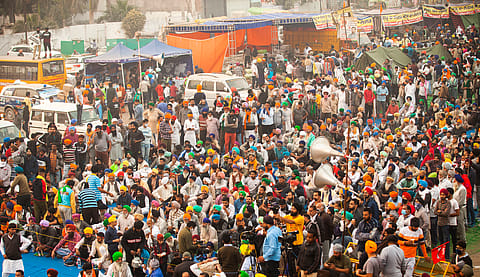Farm laws: Farmer groups remind guaranteed MSP still pending
Farmer groups welcome the decision but have said the demand for a statutory guarantee of remunerative prices for all agricultural produce for all farmers remains unfulfilled.

In a deft political move—that could tilt the outcome of the forthcoming elections to the State Legislative Assemblies of Punjab, Uttar Pradesh, and Uttarakhand—Prime Minister Narendra Modi has announced that the three controversial farm laws will be repealed during the forthcoming winter session of the Parliament that begins on November 29.
The Prime Minister’s decision to repeal the three Acts—The Farmers' Produce Trade and Commerce (Promotion and Facilitation) Act, 2020, The Farmers (Empowerment and Protection) Agreement of Price Assurance and Farm Services Act, 2020, and The Essential Commodities (Amendment) Act, 2020—will be hailed as a huge success for Samyukta Kisan Morcha (SKM)—the coalition of 40 odd farmer organizations that have been agitating against the laws on the borders of Delhi for almost a year now. The farm agitation had not only seen thousands of farmers from Punjab, Haryana, and Uttar Pradesh converge on the borders of Delhi but had also resulted in governments using force against the agitators and protests turning violent in several parts of North India.
SKM welcomed the decision and said it will wait for the announcement to take effect through due parliamentary procedures. “If this happens, it will be a historic victory of the yearlong farmers' struggle in India. However, nearly 700 farmers have been martyred in this struggle. The central government's obstinacy is responsible for these avoidable deaths, including the murders at Lakhimpur Kheri”, SKM leaders have said.
The farmers’ groups have also said that their agitation is not just for the repeal of the three laws, but also for a statutory guarantee of remunerative prices for all agricultural produce for all farmers. “This important demand of farmers is still pending. So also, is the withdrawal of the Electricity Amendment Bill. SKM will take note of all developments, hold its meeting soon and announce further decisions”, the leaders have said.
Meanwhile, former Punjab chief minister Captain Amarinder Singh—who left Congress to float a new political party recently and had set repealing of three farm laws as a pre-condition to ally with BJP—to jointly fight Punjab state elections early next year— has congratulated Modi in a tweet. “Great news! Thankful to PM @narendramodiji for acceding to the demands of every Punjabi & repealing the 3 black laws on the pious occasion of #GuruNanakJayanti. I am sure the central govt will continue to work in tandem for the development of Kisan!” the tweet reads.
The dissenting farmers have been opposing the three farm laws—as they feared it will provide more freedom for agri-business to purchase and corporatise Indian agriculture without benefit to the farmer. The SKM leaders had alleged that the three laws will deregulate trade on farmers produces, destroy the food security, and erode existing legal safeguards that prevent exploitation of rural agricultural market by the corporate giants.
On the other hand, the government has been justifying the Farmers' Produce Trade and Commerce (Promotion and Facilitation) Act, 2020. The government has reiterated that it seeks to create an ecosystem, where the farmers and traders are given a choice to trade agricultural produce at remunerative prices through competitive alternative barrier-free inter-state and intra-state trading channels, that do not come under the purview of the state agricultural produce market legislations.
Recommended Stories
The government’s logic to enact the Farmers (Empowerment and Protection) Agreement of Price Assurance and Farm Services Bill, 2020 was to provide a national framework on farming agreements that protects and empowers farmers to engage with agri-business firms, processors, wholesalers, exporters or large retailers for farm services and sale of future farming produce at a mutually agreed remunerative price framework fairly and transparently.
The amendment to Essential Commodities Act, the government said, will remove commodities like cereals, pulses, oilseeds, edible oils, onion, and potatoes from the list of essential commodities, and hence allow freedom to private businesses to procure, hold, move, distribute and supply these commodities without stock or movement restriction.